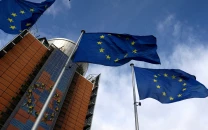Talking business
This economic team is so thoroughly out of options and ideas they are contemplating the inevitable.

Consider for a moment that there is a history and context here, like everywhere else. The history comes out of a decision made about a year ago to channel the economic reforms through parliament, making this the first time that any major economic legislation would be debated in parliament (the 1991 Sales Tax Act was routed through the Finance Bill and never really debated on its own). Tax reform, particularly the Value Added Tab bill, had been introduced, and good amount of political backing for it had already been secured when the new finance minister arrived on the scene.
Then the bill languished as the economic team debated the numbers for the outgoing fiscal year. Support garnered for it in the standing committees began to whither and the new team was unable to shepard the bill out of committee. So they abandoned the approach to parliament altogether, left the bill, and announced a new initiative that they called Reformed General Sales Tax (GST) and fixed a new deadline of 1st October.
The Reformed GST was to be executed largely through executive fiat, by withdrawing SRO induced exemptions for starters. The approach had its advantages: no parliament to reckon with, no messy debates, no public scrutiny. It could be executed entirely through closed door negotiations between small numbers of people and without all the irritating distractions of a public debate.
But if things were going to be so much easier to go through this route, then why was there a push to take matters to parliament in the first place? Were the framers of the VAT bill out of their minds to take such vital and complex legislation into a public forum where it could get misrepresented and twisted out of context? No, they weren’t.
The reason why the VAT bill was taken to parliament in the first place was to put a stamp of legitimacy on it that it would never have if passed through an ordinance, bundled into the finance bill, or passed piecemeal through SROs or other forms of subordinate legislation. There was, in fact, a vision behind the bold gambit to place the VAT bill before parliament.
The move forced the political parties to look at economic matters with political seriousness for the first time. It forced the IMF to accept the will of parliament for the first time too. It was indeed a bold move to send the bill to parliament and it could yet have succeeded there.
Initial debates on the bill were sober affairs. Nobody in the standing committees engaged in political grandstanding, or pitched to the peanut gallery. Instead, legislators were calling people before them to help understand the intricacies of the legislation and granted they had a long way to go, but still the fact that sober debate was taking place around the measure was a clear sign of progress for economic reforms. It remains the feeling of many that the measure stood a good chance of actually passing in committee, the numbers were stacked up in its favour.
But then the change of administration happened. The new finance team entered with an entirely different set of priorities and a clear taste for carrying on its business outside the public glare. The new team had no spokesman, in fact still has no spokesman, eschewed contact with media and thought it could play the political field as an equal with those who have faced the ballot box.
In short, the new team dropped the ball. Today we are back to back room negotiations as the main forum where economic matters are discussed, back to the days when reforms were perceived as acquiescence to the will of outsiders. With the withdrawal from the public forum, economic policymaking has suffered a mighty blow. Surrendering legitimacy for convenience is something the new economic team is going to pay for the rest of its time in office.
The writer is Editor Business and Economic policy for Express News and Express 24/7
Published in The Express Tribune, September 27th, 2010.


















COMMENTS
Comments are moderated and generally will be posted if they are on-topic and not abusive.
For more information, please see our Comments FAQ